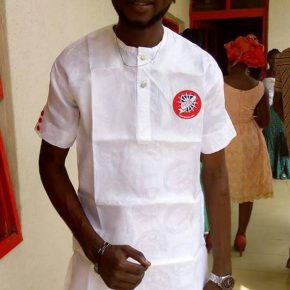Synchronized Chaos International Magazine interviews Akinmade Zeal here so that he can describe his inspirations and thoughts in more detail.
The first of my poems, Father and Son, as I have said, is a poem that talks about racism and class prejudice in contemporary society. I like to say it is a post modern piece. It is immanent, transcending beyond the Nigerian setting. Nigeria happens to be the microcosm of the macrocosm (the world) in the poem.
It is a dramatic poem. You find the father, a more experienced person in the world, educating his son on the evils in the world. The child comes back from school, battered and with the taste of bile in his mouth. His father eavesdrops and comes over to educate him; tells him he will put him in a better school so he can meet people of his own social class and fit in better. But, his father also was quick to remind him that even at the new school, he would find no peace. ‘Peace cannot romance with men as beast as they are’ unless they crush class, hierarchy, bigotry and so on. That’s the only condition for peace. It depicts the nature of the world generally, not just Nigeria. It is sheer coincidence that the poet is a Nigerian and sets the poem in a Nigerian context. He is of a more radical perspective, not parochial, nor oblivious of what happens outside his own setting.
The second poem is a rather more complex work. Every line of that poem, A Whim To Lie, is symbolic and saddled with imagery. It cannot make much sense to A South African, it cannot make much sense to A Ghanaian, it cannot make sense even to a Nigerian from the minority Hausa, Ibo, Ijaw groups we have in Nigeria. The poem would only make much sense to A Yoruba (the majority tribe in Nigeria to which Soyinka belonged) person who is well familiar with the pantheons of the Yoruba people. If you study Soyinka to the letter, you find him talking about Ogun, the non benign. Ogun is one of the gods of the Yorubas. To understand that poem, you need understand how these gods work in the Yoruba settings. Ogun is known to be a keeper of sacred oaths, sanity, and the god of iron, and he was so feared that he was said to relish bathing in blood. Ogun is still worshipped here in Nigeria by motorists and cyclists as they see him as the pinnacle of their existence and profession.
A Whim to Lie is also a postmodern work, a social satire about politics and contemporary ills in Nigeria. The Christian God in Revelation 22 says : ‘Behold, I come quickly and my reward is with me to give unto every man according to how his works had been.’ I have placed the traditional Yoruba gods up on a pinnacle to perform that function, judging every African and asking to hear all the ills of the land. I tell the reader that I would have to lie to the gods if they wanted a report on the world’s behavior. Otherwise, would I have to tell them about the money the politicians bury in Ikoyi building (How shall I tell you our fertile soils? How shall I tell you Ikoyi spouts legal tenders? These are facades of the truth I lack the temerity to tell) Acertain politician here in the country who stole money and kept it in Ikoyi, Lagos, Nigeria is the object of my satire there. I reported his behavior to the gods, as our demiurge and arbiter.
Again, I talked about the Big Brother Nigerian reality show here where a certain lady bares her breast live on the T. V. That’s not something we tolerate in our culture, it’s un-African. I spoke to the gods about that, telling them to not be angry should I lie, for I cannot boast the courage to tell them about her lack of modesty (our damsels bare their breasts for bigger brothers).
It could go on and on. If you understand the Yoruba pantheons, you would unearth the poem sheepishly!
Nigerians have no choice but to satirise the society in which they find themselves. Nigeria is such a beautiful country, rich in all facets, lands, gold, petrol, bitumen, everything you could ever imagine. But as Soyinka would say : ‘we have enough for our need, but never enough to satisfy our greed.’ In a country where the politicians have such awful greed and brutish behavior that they could steal what they don’t even need, you expect such literature from the people. You expect that they explore the dark nature of the human mind. That spurs the peculiar literature that teems throughout Nigeria.
Writing is hardly a regular job here. It is an act of sheer passion and motivation. Here in Nigeria you don’t get to earn from books, poetry or freelance journalism. Even getting your books published is a very herculean task. Very expensive. And if you manage to get a book published, you will surely have issues of piracy to deal with. Intellectual properties aren’t respected here thanks to the culpable government we have. You need both a regular job and motivation to write here.

